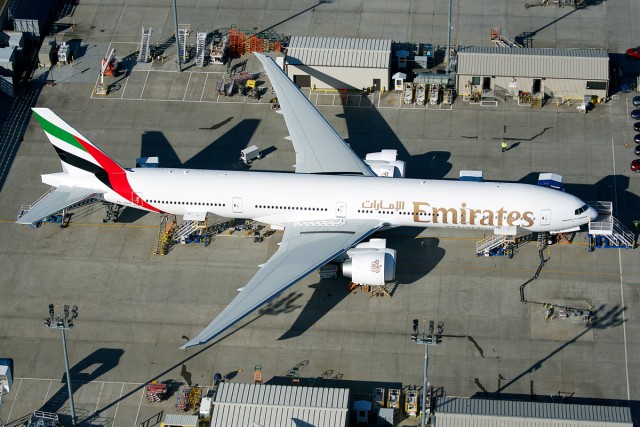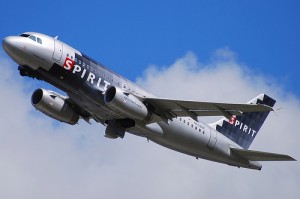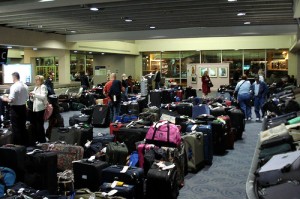
An Emirates 777-31H/ER sits in a delivery stall at the Boeing Paine Field – Photo – Bernie Leighton | AirlineReporter
It’s that time again. Time for me to give you some of my personal thoughts on a topic. Some might call it a rant.
You know the time when an American aviation lobby group decides that there’s just too much competition in the world? Not only is it the “Big Three” themselves, but also an aviation lobbying group backed by them. Combined, these companies and interest groups can bring a lot more lobbying firepower to the table.
Their argument, as is everyone’s against someone who does business differently than them, is the old fallacy of “if their costs are lower than ours, it must be the result of either unfair trade practices or shady accounting.”
This time, the argument is about how Gulf airlines Emirates, Etihad, and Qatar Airways may have received launch subsidies. Indeed, the argument goes further and states that they are continuing to receive subsidies to fuel their current expansion and operation.

Spirit Airlines Airbus A319-132 (N532NK)
Spirit Airlines has been fined $375,000.00 due to customer complaints for overbooking flights, lost bags, and poor advertising practices.
First off, the airline was not properly compensating passengers who were bumped due to overbooking, which Federal law regulates they must. Spirit was also dragging their feet when compensating passengers for lost baggage. Airlines must make payment “within a reasonable period of time” which most people would agree 14 months is not reasonable. If that wasn’t enough, the airline also was charging customers $4.90 for a passenger use fee to fares in their “Travel Deals” portion of the website. According to regulation, such fees need to be added into the advertised price.
This comes at a time where Congress is in process of passing a “passenger bill of rights” which will better protect passengers flying on all airlines in the United States. Over the past two years, Congress has also provided the Transportation Department with $2.5million in the past two years to help enforce customer-protection rules.
’œSelling fares for $9 has made us very popular and, a few years ago when we adopted this model, we had some growing pains during the transition,’ Spirit spokeswoman Misty Pinson said in an e-mail to the Atlanta Business Chronicle. ’œWe have addressed all the core issues that caused customer experience challenges a few years ago, including upgrading our computer systems and utilizing a new reservations partner.’
Customer treatment is currently on the forefront of the airline industry. I am normally for the industry regulating itself and allowing customers to help steer what the industry does, but it seems some airlines just don’t get it and passengers have a short memory span when choosing what airline to fly. A passenger might have a horrid experience and say they will never fly a particular airline again. But the next time they fly, if that same airline is $25.00 less, they ’œforget’ their previous experience and decide to save a few dollars.
Image: ChicagoKoz

Baggage Claim at PHL
The European Union (EU) is pushing to create tougher regulation over airlines and airports that damage and lose luggage.
Recently, United Airlines felt the brunt of a passenger who had his guitar broken during a flight. He was unhappy with how the airline treated him and if you agree or disagree, his video went viral and got a positive reaction from United.
Of course this strategy cannot work for everyone. The EU Commission is proposing that each EU country create an agency to monitor incidents of lost and damaged bags. An EU Commission survey shows that between November 2008 and March 2009, airlines on average lost one bag for every 64 passengers. ’œIt’s a serious problem,’ European Transport Commissioner Antonio Tajani said, ’œWe have to act.’
With airlines charging more for checked bag fees, it is frustrating that so many bags in the EU would be lost and damaged. Even though having less baggage lost would of course be better, is it worth all the extra money it would cost to have the government watch over the industry?
Image: Casteel


